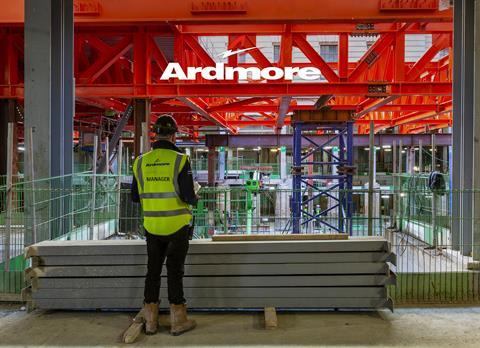Group director says legislation ‘significantly increased’ exposure at Ardmore Construction which went into administration last month

The extension of liability for building safety work to three decades made under the Building Safety Act led directly to the collapse into administration of £313m turnover Ardmore Construction Ltd, the firm has said.
Martyn Horne, development director at the parent company Ardmore Group Ltd, which is still trading, said in a statement to Building that Ardmore Construction Ltd (ACL) had ceased to take on new work in 2021 in order to focus on remediating previously built homes.
However, Horne’s statement added that the group’s plan for an orderly wind down of the business, which was for “nearly 50 years” its sole contracting entity, became unviable when the Building Safety Act “significantly increased ACL’s exposure”.
Contractor ACL, which was put into administration on 28 August, was responsible for building thousands of high-rise homes for housebuilders, particularly during the decade leading up to the 2017 Grenfell fire.
The Building Safety Act retrospectively extended the statute of limitation for claims under the Defective Premises Act out to 30 years for schemes built prior to the Act coming in to force in 2022.
After the Grenfell fire, it became apparent that common cladding designs and some build practices in the industry hadn’t been sufficient to ensure safety, with consequent surveys resulting in the need for costly repairs to many high-rise schemes.
ACL has seen six claims filed against it for remediation work on previously built schemes in the past year alone, with the value of these topping £150m.
Ardmore’s Horne said that prior to the extension of the statute of limitation for claims, the group had been taking a “proactive and responsible approach to historic issues”, which included setting up a new business, Landmark Facades, to reclad major schemes such as Greenwich Peninsula and Parkside Lewisham.
He added the business had spent £85m prior to administration on remediation works and that “we had always intended resolving those issues before winding ACL down as a non-trading entity”.
But he added: “Unfortunately, the Building Safety Act 2022 fundamentally changed the rules by extending limitation periods from 12 to up to 30 years, which significantly increased ACL’s exposure.
“That shift, and subsequent previously statute-barred claims – such as [Barratt scheme] Crown Heights [in Basingstoke] – forced us to review the sustainability of this approach and - ultimately - bring forward ACL’s closure.”
Horne said that defending ACL’s “historic liabilities” had “tied up management time and created uncertainty for the wider group” but that “the decision was not about avoiding our responsibilities”.
Horne said that during this period, the wider Ardmore group has taken on new business solely through other group companies and that, prior to entering administration, any remaining live contracts within ACL were novated to other group companies.
In a separate statement, the business as a whole said it is on course to turn a £2.5m profit in the year to September 2025 and expects to bring in revenue of more than £400m in 2026.
>>See also: Could the shadow of Grenfell trigger more Ardmore-style collapses?
Building understands the administration was managed in such a way that suppliers and specialist contractors have been paid and protected in most instances. However, remediation works on the affected buildings constructed by ACL are understood to have stopped.
Horne said the firm’s approach “helped to protect and isolate the rest of the group from the impact of the administration of ACL and over the last six months we have been further preparing to minimise any residual impact on the wider group.
“This has included the novation of certain main contracts and supply chain contracts to other group companies, protecting our supply chain and - as ACL had no live projects at the time of entering into administration - ensuring that cashflow to the remainder of the group also remained unaffected.”
He added that the group’s debt levels remain unaffected. Horne said: “For the avoidance of doubt, the remaining entities within the Ardmore Construction Group Limited are unaffected and are still trading as going concerns.”
Cormac Byrne, chairman of Ardmore Construction Group, said: “The last two years have tested the entire industry but we’ve emerged stronger. We’ve taken tough decisions, restructured how we work and focused on delivery that we know we can control, which has brought us back to profit.
“ACL played a major role in our history but it no longer fits how the group operates. The decision to close it has been taken and we’re now just drawing that chapter to a close, with minimal disruption to the wider business.”
A spokesperson for ACL’s administrator Begbies Traynor said it did not have anything to add, beyond confirming that Dominik Czerwinke and Jamie Taylor of Begbies Traynor and Jason Callender of Panos Eliades Callender & Co “were appointed Joint Administrators of Ardmore Construction Limited on 28 August 2025”


























No comments yet